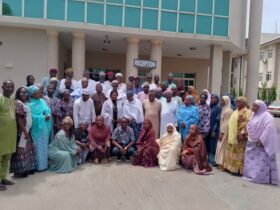In a renewed effort to tackle maternal and child malnutrition, Alive & Thrive, in partnership with the Kaduna State Primary Healthcare Board, is stepping up logistics support for the distribution of Multiple Micronutrient Supplements (MMS) across the state.
During a sensitisation forum held Friday in Kaduna, key stakeholders—including Ward Development Committees, nutrition focal persons, and ALGON representatives—were mobilised to back the initiative. The goal is to ensure the regular supply of MMS, a vital daily supplement containing 13–15 essential vitamins and minerals for pregnant and breastfeeding women.
This coordinated effort aims to improve maternal and child health, especially in underserved communities where poor diets fail to meet basic nutritional needs.
The State Coordinator of Alive & Thrive in Kaduna, Mrs Sarah Kwasu, said nearly half of all under-five mortality wad caused by underlying maternal and child undernutrition, including micronutrient deficiencies.
Kwasu said the high prevalence of anaemia in women of reproductive age and pregnant women in Nigeria was a significant public health problem.
He said,”This is because of its negative consequences for pregnancy outcome and its impact on maternal mortality.
“In addition to anaemia, deficiencies such as vitamin A, zinc, vitamin B1, iodine, and folate are also widespread in Nigeria and have a negative impact on pregnancy outcome.”
She, therefore, said improvements in the natural diet and behavioral change were difficult to achieve over a short time span for populations in resource-constrained countries.
“Combining all micronutrients in a multi-supplement and delivery of a multiple micronutrient supplement to women in targeted groups is more programmatically feasible and should be embraced.
“Over the past five decades, iron and folic acid supplementation has become a core component of antenatal care for pregnant women around the globe.
“However, more than 20 years of research provided clear evidence that multiple micronutrient supplementation is more effective than iron and folic acid supplementation in preventing adverse birth outcomes”she said.
She said that MMS was a safe, efficacious, affordable, and cost-effective intervention to improve maternal nutrition.
Kwasu added that babies born to mothers suffering from undernutrition and anaemia were more likely to be born with low birth weight, increasing their chances of developmental delays.
“Making MMS available to all women in Nigeria can act as a social equalizer by offering all pregnant women the same standard of care.
“Diets of women in developing countries are lacking in a wide variety of micronutrients, with potential to endanger pregnancy process and outcome,”she said.
Kwasu, therefore, emphasised the role of WDCs Chairmen in supporting primary health care revitalisation, engaging community leaders to monitor pregnant women, and advocating dedicated funding for logistics to bring MMS to health facilities.
She said the WDCs were expected to visit PHCs to ensure there is no stockout of vital medicines, including MMS, and encourage proper documentation of MMS utilisation at facility level for decision-making.
“WDCs are also expected to support PHC revitalisation in their LGAs, ensuring they are fully operational with required staff, infrastructure, and supplies, including provision of MMS,”she said.
Mrs Halima Ibrahim, the state’s Logistics Officer for Nutrition Programme, said they would ensure the successful MMS distribution to the health facilities, following the right logistics channels.
Also, Jibril Isa, the Quality Assurance Officer for Kaduna State Emergency Nutrition Action Plan, said that the engagement was to ensure that all the nutrition services in the state had the support of the communites.
Isa stated that the WDCs would support logistics supply to the last mile distributions and mobilise communities to ensure MMS distribution at health facilities.
He added that the WDCs would also monitor health facilities to ensure quality services were provided, checking if facilities were delivering services or not, as part of their role in supporting MMS implementation.
Isa advised NFPs to be accountable for distributed items, by showing WDCs what was distributed to health facilities and ensuring WDCs understand what is available in the community.
The Chairman of WDCs in Kaduna State, Alhaji Balarabe Jaji, said WDCs wanted a clear mandate to operate effectively.
Jaji said WDCs have members in all political wards, where they ensure health and education sectors meet their responsibilities and bringing information from communities to hospitals, schools and vice versa.
He restated the WDCs commitment to doing the right thing, by bridging the gap between community and government, while urging members to avoid overstepping boundaries, but to work for the benefit of the people and government.
The ALGON Desk Officer at the Ministry for Local Government and Chieftaincy Affairs (MLGCA), Emmanuel Anche, emphasised that the ministry was concerned about interventions affecting the well-being of women and children.
He stated the MLGCA’s commitment towards providing support to WDCs and increased funding for nutrition at the LGA level, thereby ensuring effective health and nutrition interventions.
In a goodwill message, Hajiya Mairo Tahir, the Communications Officer of Accelerating Nutrition Results in Nigeria (ANRiN) project, said their mandate was providing basic nutrition services to vulnerable groups, including children under five and pregnant women.
She commended Alive & Thrive and the SPHCB for organising the meeting, saying that MMS would prevent malnutrition from a child’s first 1000 days, and hoped that WDCs will create awareness among men to support their women in accepting MMS.
Chinwe Ezeife, Nutrition Specialist, UNICEF Kaduna Field Office, made a presentation on MMS in the upcoming first round of 2025 Maternal and Neonatal Child Health (MNCH) week implementation.
She urged all the stakeholders to support the effective implementation MMS during the MNCH week, ensuring its availability and accessibility to all pregnant women, to improve maternal and child health outcomes.



